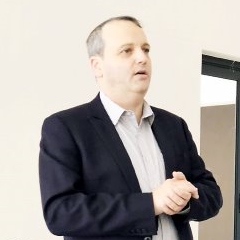click to dowload our latest edition
CLICK HERE TO SUBSCRIBE TO OUR NEWSLETTER


Published
6 years agoon
By
adminJORDAN MOSHE
“If we don’t adopt the behaviours of a majority group, we will miss the chance to be a leading force in religious dialogue with politicians and in the anti-Israel discussions,” said Kariv. He was addressing an audience at Beit David shul in Sandton on Sunday.
Kariv, who is executive director of the Israel Movement for Reform and Progressive Judaism (IMPJ), said: “We (Progressive Jews in South Africa) are positioned to lead the conversation with the ANC and to oppose BDS activity in South Africa. Without being blind to our challenges, we need to see that this sphere has a place for us to make a unique contribution.
“Our task is to find a way to rejoice in our progress without getting weighed down by our problems, but not overlook our problems as a result of our rejoicing.”
Kariv called on the Progressive community in South Africa to stop perceiving itself as a victimised minority and to assume its role as a leading religious force.
Stressing the role that the Progressive community has to play in Judaism, Kariv encouraged his audience to move out of the shadows and into the centre of the religious arena.
“Progressive communities around the world suffer from Stockholm Syndrome,” said Kariv. “They adopt the opinions of those around them which say that they have no place, that they cannot make a difference to Jewish life, that they are of no significance.
“While I am aware that this is not easy, we need to act as though we are a majority force and change our perspective of ourselves. We need to release ourselves from this belief that we are a hunted minority.”
Failure to do so, he fears, will result in the loss of an opportunity to play a vital role not only internationally, but in South Africa as well.
When asked whether the welfare of the South African Progressive Jewish community is really a concern in Israel, Kariv responded by saying that it is not about what Israel can give the community, but what the community can give to Israel. “We in Israel oblige ourselves to give you what you need. The fact that I’m here shows that we believe your community is relevant,” he said.
“But your community can give something unique to Israel – the South African story. Your history and TRC experiences have a role in healing the wounds in our neighbourhood. There aren’t many successful models of countries which moved from a negative to a positive reality except South Africa.”
Kariv went on to say that the contribution of this healing is the way South Africa can enter the Middle East arena.
“Your entry ticket into the Middle East is not the BDS,” he stressed. “The anti-Israel lobby and the downgrade of the embassy are not ways to make South Africa a legitimate force in the region. The political elements of the situation in the West Bank need to be addressed by Israel and its government, perhaps Trump and the US. But this is not South Africa’s place.”
Although he acknowledged that he is not as familiar with the religious context in South Africa as he is with Israel or the US, Kariv reiterated his firm belief that the Progressive community here has achieved something remarkable and has the potential to do so much more.
“In the last 85 years, the Progressive community has made great strides in dealing with various challenges in its path,” he said. “The community here is a devoted, strong, Zionist-based force. I see here a powerful Jewish infrastructure in both the Orthodox and Progressive communities.
“While both can engage with the wider world, I think that perhaps the Progressive community is better equipped to make a significant contribution against the anti-Israel lobby.
“Any South African who claims that there are parallels between Israel and apartheid disparages the memory of those who were true victims of oppression here. Comparing the two is a form of apartheid denial.
“The Progressive community has a role to play in developing more sophisticated dialogue with politicians and activists because of its nuanced and liberal approach. Progressive Jews have the ability to look at reality and see that we have not arrived at a perfect state of existence yet. They are not satisfied with the status quo and are able to identify elements of society which need development.
“They are therefore better able to acknowledge the shortcomings of Israeli governance and can use their strengths of pluralism to bridge the gap between South Africa and the Middle East in dialogue.”
Unless the progressive community recognises its inherent ability to play this role, Kariv fears that nothing will change and the impact of the BDS will continue to damage any prospects of progress in the Middle East.
“The BDS betrays the legacy of Mandela,” says Kariv. “Pro-Palestinian South Africans need to see that in the long run, their actions are not in the interests of the Palestinians and that they are doing more harm than good.
“This can only be made apparent if we step up and engage with South African leadership as a community which has a clear sense of self and purpose. If we are to make a difference, we need to see ourselves as being equal to the task, stop believing we have a chip on our shoulder, and make a difference with the force of a majority group.”
